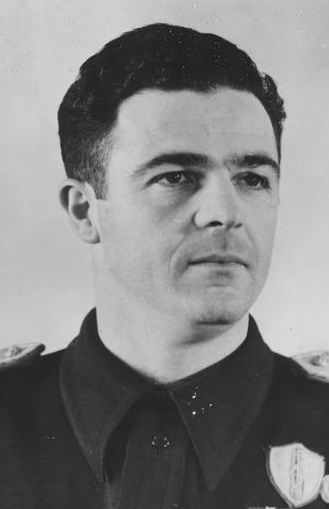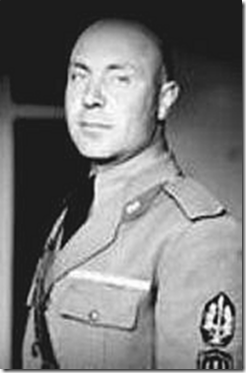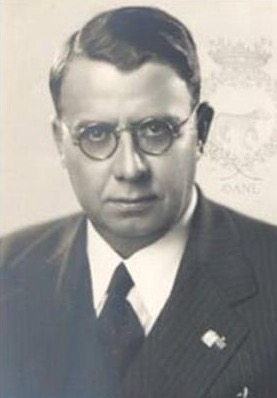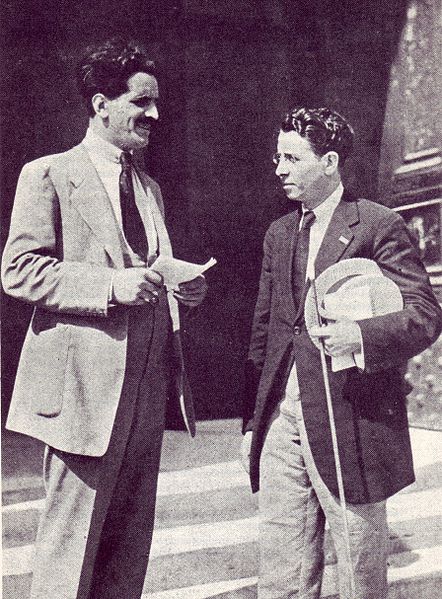<Back to Index>
- Secretary of the Fascist University Groups Aldo Vidussoni, 1914
- Secretary of the National Fascist Party Carlo Scorza, 1897
- Minister of Finance Giacomo Acerbo, 1888
PAGE SPONSOR

Aldo Vidussoni (1914, Fogliano Redipuglia, in Gorizia - 1982, Cagliari) was an Italian lawyer and Fascist politician.
After law studies at the University of Trieste, Vidussoni joined the Partito Nazionale Fascista (PNF) in May 1936. He was a volunteer soldier in the Second Italo - Abyssinian War, and then on Francisco Franco's side in the Spanish Civil War; he lost an eye and an arm on the Santander front, and was awarded a gold medal for valor in combat. Aldo Vidussoni's reputation made him an asset with the Benito Mussolini régime, and he became an important figure in the hierarchy of the Fascist university corporations - the Gruppi universitari fascisti (GUF). First a secretary of the GUF for the Province of Trieste (in 1938), he was (1940 – 1941) inspector for the GUF in Enna, and, in November – December 1941, national secretary of the GUF.
On 26 December 1941, while still quite young, Vidussoni was appointed national secretary of the PNF, replacing Adelchi Serena by order of Mussolini. His scant political experience and the constant criticism of other leaders had made him ill - suited for the task: despite his initial appeal as a decorated soldier, he soon became widely regarded as ineffective, even "ridiculous". Vidussoni was abruptly replaced by the ruthless squadrista Carlo Scorza in early 1943.
After the pro - Allied coup inside the Grand Council of Fascism in late July 1943 and the armistice signed by the Pietro Badoglio government in Cassibile, Vidussoni chose to side with the Nazi backed Italian Social Republic (established and led by Mussolini in the north). He became a leading member of the refounded PNF, the Partito Fascista Repubblicano (Republican Fascist Party).
After World War II, Aldo Vidussoni lived in Verona and then Cagliari. He worked in insurance.

Carlo Scorza (1897, Paola, Province of Cosenza – 1988) was a prominent member of the National Fascist Party of Italy during World War II. He built his reputation in the Fascist paramilitary group known as the Blackshirts, and later rose to the position of party secretary, second only to Benito Mussolini in authority over the wartime Italian state. His brief and rocky tenure began in the spring of 1943 and ended with the party's collapse and abolition at the end of July.
Born in the town of Paola, Scorza participated in World War I in the Bersaglieri corps where he reached the rank of Tenente (lieutenant). After the war he joined Benito Mussolini's National Fascist Party and participated in acts of violence against communists and socialists in the area around Lucca. After participating in the March on Rome, he worked for a brief time as a journalist, then he was named Federale (chief provincial party officer) of the Province of Lucca.
In 1930, Scorza was appointed to direct the key Party youth organization, Gruppo Universitario Fascista. The following year he was named as a member of the Direttorio (a high national body) of the National Fascist Party. He strongly opposed the Azione Cattolica and his behavior forced Mussolini to dismiss him from the Direttorio. He participated in the Second Italo - Abyssinian War and the Spanish Civil War. In 1940 he came back to national political activities.
In April 1943, Scorza was named Secretary of the National Fascist Party, replacing the ineffectual Aldo Vidussoni. He remained fully dedicated to Mussolini and he assumed his office with an uncompromising demand – "Everybody and everything for the war."
Despite his enthusiasm, Scorza failed in his efforts to revitalize the party. On 25 July 1943, the President of the Italian wartime Parliament, Dino Grandi, put forth to the Fascist Grand Council a motion to remove Mussolini from office. Scorza, who also held the position of Secretary of the Grand Council, voted against it, but the motion carried and Mussolini was arrested by the carabinieri. After the Italian armistice, Scorza himself was arrested in the Nazi controlled Italian Social Republic. He was charged with treason for failing to counter the anti - Fascist coup d'etat, but he was acquitted by a special tribunal in April 1944.
At the end of World War II, Scorza fled to Argentina. He was tried in absentia by the Allies and sentenced to thirty years imprisonment. He was later granted amnesty and he returned to Italy in 1955. Sforza died in Florence on 23 December 1988.



Giacomo Acerbo, Baron of Aterno (July 25, 1888 – January 9, 1969) was an Italian economist and Fascist politician that drafted the Acerbo Law which solidified Benito Mussolini's position once in power.
He was born to an old family of the local nobility of Loreto Aprutino (province of Pescara), and was educated in Pisa, graduating in agricultural sciences from the University of Pisa in 1912. Acerbo's affiliation with the Freemasons led him to become an advocate of irredentism and Italy's entry to World War I. When war exploded upon the continent, he volunteered for military service. By the end of the war, he was decorated with three silver medals for military valor and promoted to the rank of captain.
Acerbo
resumed his work as an assistant professor in the faculty of economics,
and planned for a university career. At the same time, he promoted the
Association of Servicemen of Teramo and Chieti (l'Associazione dei combattenti di Teramo e Chieti), which broke away from the national association after the election of 1919 and became the Provincial Combat Group (il Fascio di combattimento provinciale).
Elected to the Italian Chamber of Deputies in 1921 with the "national bloc", he acted as a mediator between local conservative forces and the Blackshirts; on a national level, Acerbo ensured peace in the open conflict between the Italian Socialist Party and Fascists, and was elected to a leadership position inside the National Fascist Party (PNF). During the March on Rome, Acerbo presided the Chamber as the coup d'état unfolded, and acted as the link between the PNF and King Victor Emmanuel III. He then accompanied Mussolini as he was designated Prime Minister, and became his undersecretary.
He made the Acerbo Law pass in November 1923; he was again deputy in 1924, winning his nobiliar title. Acerbo was marginally involved in the inquiry over Giacomo Matteotti's killing, and left his position in the government. In 1924 he instituted the Coppa Acerbo in memory of his brother Tito Acerbo (a war hero). Giacomo Acerbo was elected vice - president of the Chamber in 1926, and was Agriculture and Forestry Minister from 1929, dedicating himself to projects for universally extended drainage. Together with Gabriele D'Annunzio, he contributed to the creation of Pescara Province in January 1927.
Acerbo became head of the Economics and Commerce Faculty at the University of Rome in 1934, and, from 1935 to 1943, president of the International Agricultural Institute. A member of the Grand Council of Fascism, he was a spokesman for the project that turned the Chamber into a representative of Fasci and Corporazioni.
When World War II began and Italy joined the Nazi German offensive, Acerbo served as member of the Italian Army General Staff during the marginal Italian maneuver in the Battle of France, and the Greek campaign. He was also Minister of Finance from February 1943.
On July 25, Acerbo sided with Dino Grandi when the latter attempted to topple Mussolini and take Italy out of the war. He voted in favor of the law that stripped Il Duce of his powers, and took refuge in his home region, the Allied - occupied Abruzzo - after Mussolini regained some standing with help from the Nazis, establishing the Italian Social Republic, one that proscribed all opponents (including Acerbo) during the Verona trial. Captured by the Resistance, he was sentenced to death by the High Court of Justice, a verdict lessened to 48 years in prison. This sentence too was overturned, and Acerbo's name was cleared in 1951, enabling him to resume his teaching career. He received numerous distinctions and titles in academia, and was awarded a gold medal (in Education, Culture, and Arts) by President Antonio Segni.
In the elections of 1953 and 1958, Acerbo was an unsuccessful candidate of the Partito Nazionale Monarchico to the Italian Parliament.
Acerbo died in Rome in 1969.
He is also remembered for his passion as a collector of ancient pottery, and created a Gallery dedicated to ceramics of the Abruzzo.